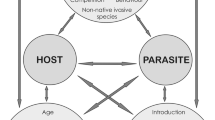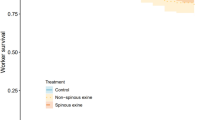Abstract
Antagonistic interactions impose pressures that can trigger shifts in defensive phenotypes. For instance, one natural enemy may activate defensive phenotypes that influence defenses that protect against other enemies. Socially parasitic ants (Temnothorax americanus) are both parasites and predators of other coevolved Temnothorax species, whose brood they either consume as prey or steal during raids to utilize as a work force in their own colonies. Since these social parasites impose a significant threat to host colonies, we explored whether exposing a T. americanus worker to T. curvispinosus host colonies could impact nest hygiene behavior, a component of collective disease defense. Specifically, we measured the latency to remove colony-mate corpses from the nest. We measured corpse removal twice before and twice after exposure to a T. americanus worker collected in sympatry to the focal host colonies. We found that simulating the initial stage of a scout raid had no effect on this measure of collective nest hygiene. These results indicate that some measures of social immunity may remain robust after a potentially stressful antagonistic interaction from a coevolved heterospecific.


Similar content being viewed by others
Data Availability
The data, associated metadata, and R code required to reproduce all the analyses are available on Figshare via the private link below. Upon manuscript acceptance, the data and R code will be made publicly available with no access restrictions at the DOI below:
Private link for peer review: https://figshare.com/s/ff5aadca802b6d29628b
References
Brandt M, Heinze J, Schmitt T, Foitzik S (2005) A chemical level in the coevolutionary arms race between an ant social parasite and its hosts. J Evol Biol 18:576–586. https://doi.org/10.1111/j.1420-9101.2004.00867.x
Cassidy ST, Chapa J, Tran T-A et al (2021) Disease defences across levels of biological organization: individual and social immunity in acorn ants. Anim Behav 179:73–81. https://doi.org/10.1016/j.anbehav.2021.06.028
Chadab R (1979) Early warning cues for social WaspsAttacked by army ants. Psyche: A J Ento 86:115–123. https://doi.org/10.1155/1979/38164
Cremer S (2019) Social immunity in insects. Curr Biol 29:R458–R463. https://doi.org/10.1016/j.cub.2019.03.035
Cremer S, Armitage SAO, Schmid-Hempel P (2007) Social immunity. Curr Biol 17:R693–R702. https://doi.org/10.1016/j.cub.2007.06.008
Diez L, Moquet L, Detrain C (2013) Post-mortem changes in chemical profile and their influence on corpse removal in ants. J Chem Ecol 39:1424–1432. https://doi.org/10.1007/s10886-013-0365-1
Foitzik S, DeHeer CJ, Hunjan DN, Herbers JM (2001) Coevolution in host–parasite systems: behavioural strategies of slave–making ants and their hosts. Proc R Soc B 268:1139–1146. https://doi.org/10.1098/rspb.2001.1627
Grüter C, Jongepier E, Foitzik S (2018) Insect societies fight back: the evolution of defensive traits against social parasites. Philos Trans R Soc B 373:20170200. https://doi.org/10.1098/rstb.2017.0200
Hamilton WD, Zuk M (1982) Heritable true fitness and bright birds: a role for parasites? Science 218:384–387. https://doi.org/10.1126/science.7123238
Hölldobler B, Wilson EO (1990) The ants. Harvard University Press, Cambridge
Johnson CA (2008) Slave-maker ant competition for a shared host and the effect on coevolutionary dynamics. Ecol Mono 78:445–460. https://doi.org/10.1890/07-1515.1
Jongepier E, Foitzik S (2016) Fitness costs of worker specialization for ant societies. Proc R Soc B 283:20152572. https://doi.org/10.1098/rspb.2015.2572
Jongepier E, Kleeberg I, Job S, Foitzik S (2014) Collective defence portfolios of ant hosts shift with social parasite pressure. Proc R Soc B 281:20140225. https://doi.org/10.1098/rspb.2014.0225
Keiser CN, Vojvodic S, Butler IO et al (2018) Queen presence mediates the relationship between collective behaviour and disease susceptibility in ant colonies. J Anim Ecol 87:379–387. https://doi.org/10.1111/1365-2656.12696
Kleeberg I, Pamminger T, Jongepier E et al (2014) Forewarned is forearmed: aggression and information use determine fitness costs of slave raids. Behav Ecol 25:1058–1063. https://doi.org/10.1093/beheco/aru084
Lemanski N, Silk M, Fefferman N, Udiani O (2021) How territoriality reduces disease transmission among social insect colonies. Behav Ecol Sociobiol 75:164. https://doi.org/10.1007/s00265-021-03095-0
Passera L, Roncin E, Kaufmann B, Keller L (1996) Increased soldier production in ant colonies exposed to intraspecific competition. Nature 379:630–631. https://doi.org/10.1038/379630a0
R Core Team (2018) R: a language and environment for statistical computing. R Foundation for Statistical Computing. Vienna, Austria. https://www.R-project.org. Accessed 21 Oct 2019
Rosengaus RB, Jordan C, Lefebvre ML, Traniello JFA (1999) Pathogen alarm behavior in a termite: a new form of communication in social insects. Sci Nat 86:544–548. https://doi.org/10.1007/s001140050672
Sun Q, Zhou X (2013) Corpse management in social insects. Int J Biol Sci 9:313–321. https://doi.org/10.7150/ijbs.5781
Therneau TM, Therneau MTM (2015) Package ‘coxme’. R package version, 2(5)
Walton A, Jandt JM, Dornhaus A (2019) Guard bees are more likely to act as undertakers: variation in corpse removal in the bumble bee Bombus impatiens. Insect Soc 66:533–541. https://doi.org/10.1007/s00040-019-00718-8
Weinstein SB, Buck JC, Young HS (2018a) A landscape of disgust. Science 359:1213–1214. https://doi.org/10.1126/science.aas8694
Weinstein SB, Moura CW, Mendez JF, Lafferty KD (2018b) Fear of feces? Tradeoffs between disease risk and foraging drive animal activity around raccoon latrines. Oikos 127:927–934. https://doi.org/10.1111/oik.04866
Acknowledgements
Experiments were conducted under permit number 2018-045 from the Florida Department of Agriculture and Consumer Services. We thank Emily Durkin for assistance with laboratory maintenance, results interpretation, and writing. This research was funded by the University of Florida.
Funding
This work was financed by the University of Florida.
Author information
Authors and Affiliations
Contributions
CNK and STC designed the experiment. STC, KS, CG, YZ and AG conducted behavioral assays. STC conducted statistical analyses, and STC and CNK prepared the manuscript.
Corresponding author
Ethics declarations
Ethics
These experiments were conducted on invertebrate animals and thus are not under the governance of the US National Research Council, though we adhered to the guidelines of the ASAB/ABS Guidelines for the care and research of animals wherever possible.
Competing Interests
The authors declare that we have no competing interests.
Additional information
Publisher's Note
Springer Nature remains neutral with regard to jurisdictional claims in published maps and institutional affiliations.
Supplementary Information
Below is the link to the electronic supplementary material.
Rights and permissions
Springer Nature or its licensor (e.g. a society or other partner) holds exclusive rights to this article under a publishing agreement with the author(s) or other rightsholder(s); author self-archiving of the accepted manuscript version of this article is solely governed by the terms of such publishing agreement and applicable law.
About this article
Cite this article
Cassidy, S.T., Saadatmand, K., Gerena, C. et al. Social Parasite Exposure and Nest Hygiene in Acorn Ants. J Insect Behav 36, 52–58 (2023). https://doi.org/10.1007/s10905-023-09819-6
Received:
Revised:
Accepted:
Published:
Issue Date:
DOI: https://doi.org/10.1007/s10905-023-09819-6




